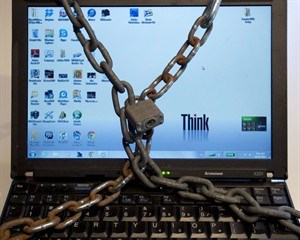
A photo illustration made December 14, 2012 in Montreal shows a computer in chains. Security experts warn about "ransomware," where computers or mobile phones are locked down by cyber thieves and money is demanded online and also cyber espionage are digital security threats in 2013.THE CANADIAN PRESS/Ryan Remiorz
December 19, 2012 - 8:54 AM
MONTREAL - Visit a porn site and you could have your computer locked down and an online ransom demanded, a security threat now expected to spread to other areas of the cyber world in 2013.
It's called "ransomware" and the idea is to scare computer users into paying money to get their machine working again and their data back, said Kevin Haley of Symantec Corp., maker of software security programs.
"The scam is usually, 'Hey we see that you have pornography on your machine and we're the police and you're going to jail for it," Haley said.
Unless you pay a fine or "ransom," he said.
That means being told online by cyber criminals to buy a prepaid card with a specific amount. The user enters the card's PIN number on the computer keyboard's numeric pad, the only thing not locked down, Haley said.
"But because it has been successful and there's money to be made, we see it expanding," said Haley, a director with Symantec's security response team in Culver City, Calif.
"So it's not just going after people who visited pornographic sites, it's going after anybody."
Smaller corporations, executives and even individuals, all of whom may not have their data backed up, are at risk in 2013, as attackers broaden their base, he said. And the victims will likely not get their data back.
"These are not honourable people. Unfortunately, we will see some really diabolical and nasty tricks used to try to force people to pay."
There are at least 16 different gangs that are involved in this based on the malware used, Haley said, adding the attacks appear to have originated in Russia and moved to Germany and beyond.
Ransomware could also hit mobile phones next year.
"People get upset when their computer gets taken over, could you imagine how upset somebody will be if they can't access their phone? People will pay anything to get their phone back," Haley said.
Steve Durbin, global vice-president of the Information Security Forum, said the move toward accessing more and more information on mobile phones, especially if they're not secure, is a threat.
"I think that's compounded further if you happen to be combining your work and personal data because then you're not just compromising your own information but also the enterprise's information," he said from London.
The U.K.-based Information Security Forum deals with cyber security challenges that its corporate and public sector members are facing.
Data that companies gather about their customers is also at risk for cyber tampering, said Durbin.
"You don't need to steal the data anymore. You just need to put something in there that's going to skew the results and you could put your competitors out of business."
Durbin said it's important for companies or governments that are attacked to be able to recover quickly.
"We don't talk about how you can prevent these things from happening anymore. We talk about resilience."
Despite the increasing sophistication of cyber threats, the enduring Nigerian 411 online scam is still the most popular, said Symantec's Haley.
The scammer tries to convince somebody that "the prince still has lots of money and if you just send him a little bit of money he will be free and he will share his millions with you," Haley said.
"It's a prepayment scam that still lives."
News from © The Canadian Press, 2012